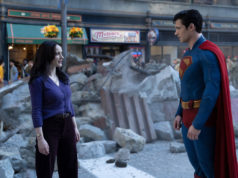For decades, Russian filmmakers have largely ignored the international audience. They’ve made films strictly for domestic moviegoers, because there have been enough of those to make a movie profitable. Occasionally, stuff has caught on with audiences outside Eastern Europe, but it seems perverse that while people all over the world read works by Tolstoy, Dostoyevsky, and Chekhov, that tradition of storytelling greatness hasn’t carried over to cinema.
Recently, for reasons that I’m not prepared to speculate on, the Russians have shifted their focus to making films for the rest of us. We started to see evidence of that this past spring with Beanpole and Why Don’t You Just Die?, and now comes Sputnik. This science-fiction thriller plays this weekend at a theater in The Colony and on streaming services, and while it may just be a knockoff of Alien, it’s a better one than some of the films that Hollywood has put out under the Alien name.
The story is set in the latter years of the Soviet era, as reckless-for-a-cause neuropsychiatrist Tatiana Klimova (Oksana Akinshina) is about to have her medical license revoked when she’s recruited for a secret mission by an army colonel (Fedor Bondarchuk). A Soviet space mission has returned to earth with only one of the cosmonauts, Cmdr. Konstantin Veshnyakov (Pyotr Fyodorov), surviving the trip. Something else has survived, a creature that has taken up residence inside Veshnyakov’s body but has already made excursions to kill his crew and one of the medics who attended to him after his landing. The state-controlled press has already proclaimed Veshnyakov a national hero. As the cosmonaut languishes in captivity at a remote base in Kazakhstan, somehow perfectly healthy and wholly unaware of the alien inside him, the doctor is tasked with separating him from it and saving the hero’s life.
The title is clever — we know the word “sputnik” as the name of the satellite that the Soviets famously launched in 1957, but in Russian, it means “traveling companion.” This is the first feature film directed by Egor Abramenko, though he directed an earlier short film called The Passenger that appears to be similar to this. He conjures up an effectively ooky moment when we first see the alien, a crawling creature that rears up on two legs to calmly regard the doctor from behind a glass partition. (The thing is only about three feet tall at that point. It gets bigger.) The scene in which she discovers what the extraterrestrial is feeding on when it’s outside Veshnyakov is also done well, as she watches the horror through infrared binoculars.
We’ve seen a ton of movies like this pay more attention to their creature effects than their scripts, but this one doesn’t fall into that trap. The doctor rightly suspects that neither the colonel nor the doctor in charge at the base (Anton Vasiliev) are telling her the whole truth about the situation. Veshnyakov reveals himself to be a man who had a bombshell dropped on his personal life shortly before he went up, and now he’s desperate to make things right. There’s even a nicely written little scene when the cosmonaut works his charm to convince a night nurse (Anna Nazarova) to abandon her post so that he can meet the doctor without being watched.
All this provides room for excellent performances by all the principals — you may remember Akinshina starring in the Swedish teen drama Lilya 4-Ever or playing a small but crucial role near the end of The Bourne Supremacy, and she does well with the character’s ethical convictions in the face of authorities who will kill her if she steps wrong. All this combines to make Sputnik an eminently watchable piece of genre fiction. It’s not Tolstoy or Dostoyevsky, but it’s a start.
Starring Oksana Akinshina, Pyotr Fyodorov, and Fedor Bondarchuk. Directed by Egor Abramenko. Written by Oleg Malovichko and Andrei Zolotarev. Not rated.












